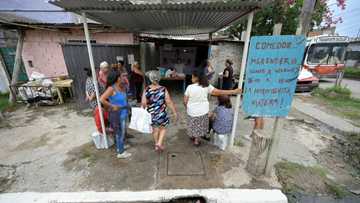"Food Alone Consumes Most of My N200k Salary, How do I Save?" Expert Advises
- A Nigerian lady who earns N200,000 monthly said her salary is no longer enough to sustain her family of five
- After buying foodstuffs and paying other necessary bills, she barely has enough to save up for unforeseen circumstances
- Financial analyst, Charles Abuede, has advised on how best the income can be well managed to sustain the family
PAY ATTENTION: The 2024 Business Leaders Awards Present Entrepreneurs that Change Nigeria for the Better. Check out their Stories!
Legit.ng journalist Zainab Iwayemi has over three years of experience covering the Economy, Technology, and Capital Market.
Esther (Not real name) is concerned about the incessant increase in the cost of living in Nigeria. She worries she may be unable to fend for herself and her family if this continues.

Source: Getty Images
The anonymous person wrote:
“Things are becoming expensive lately. The cost of basic food items and other utility bills now consumes most of my income, and I barely have enough left after paying for these costs.
“I earn 200,000 monthly. How do I effectively plan my income so that I can still save from my monthly take-home?”
“My family of five depends on me, but I am scared that we may end up on the street if this continues, as I may not be able to meet up with the cost of house rent.”
Charles Abuede is a research and economic analyst with cognate experience in investment banking and research. He specialises in research, econometric and financial modelling, and small business management.
Need for financial planning
The concept of financial planning is one that we do not consider a priority in Nigeria as we tend to spend over 50% of our income on food and shelter.
The reality in Nigeria is high inflation and an FX rate that is already on the rooftop. This is a lot for someone with a family of five to cater to.
Income diversification necessary
We need to begin cultivating the habit of diversifying income to grow wealth.
The inflation at a 27-year high has eaten so deep into the pocket of the average man that they can barely afford the basic expenses. For instance, the minimum wage can no longer buy a bag of rice.
The exchange rate also affects our income, which has a trickle-down effect on the naira.
But we need to understand that saving is not just about keeping money in the bank. Monies held in the bank don't grow, which is why savings in the form of investment are essential.
What to invest in
I advise an investment in low-risk assets like mutual funds. This involves a group of people coming together to grow their wealth, which a fund manager manages.
Investing in mutual funds depends on the kind of funds you want to invest in.

Read also
"My friend got scammed N35m after investing in crypto; how can I invest safely? Expert speaks
Instead of keeping your money in the bank for the institution to make more money for themselves and pay you a low percentage of the money, it is advisable to put it in a mutual fund to get a good investment return.
This does not require a lot. You can start investing as low as N5,000 per unit or N10,000 per unit.
It is like monthly saving but even better than thrift (Ajo) because you can also get interest in addition to your money.
Invest in FGN bond
Another investment would be the FGN bond, which gives a guaranteed investment and is a low-risk investment.
The savings-investment is made monthly, and you can invest as little as N5,000 for two or three years.
It also gives room to liquidate and give interest at a reasonable amount paid by the government at intervals. At the end of the tenure, you will still get your principal.

Read also
Access, UBA, Zenith, others offer attractive exchange rate for customers to covert dollar to naira
These are the little forms of savings that help you improve or preserve wealth.
Once you have done this with 20% -70% of your salary, the remaining can be held in cash. Then, you can keep the remaining emergency funds in the bank for precautionary motives for daily upkeep.
Time to invest wisely
For someone who earns N200k in Nigeria, in the face of the rising cost of commodities, FX issues, and other prevalent challenges, these kinds of investments will help to survive the present Nigeria and fend for a large family.
Disclaimer: Advice given in this article is general in nature and is not intended to influence readers' decisions about solving issues of threats. Readers should always seek their own professional advice that takes into account their own personal circumstances before making any decision.
Do you have a story to tell? Want an expert's advice? Please email us at ask.an.expert@corp.legit.ng with 'Ask an expert' in the subject line.
Banks deposits hit N2.41tn
Legit.ng earlier reported that Nigeria’s Deposit Money Banks (DMBs) and merchant banks in the past 13 days deposited a whooping N2.41 trillion with the Central Bank of Nigeria (CBN).
The deposits were done through the CBN’s Standing Deposit Facility (SDF).
A Standing Deposit Facility is an overnight deposit facility that allows banks to park excess liquidity (cash) and earn interest.
PAY ATTENTION: Unlock the best of Legit.ng on Pinterest! Subscribe now and get your daily inspiration!
Source: Legit.ng





